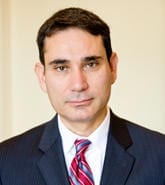
Mexico’s President-elect Enrique Peña Nieto wants to add a paramilitary force to the legion of police officers and military troops fighting the country’s brutal drug war. But will that force be effective? Or will it be yet another law enforcement agency that saps resources from Mexico’s long-term projects, such as judicial reform? Tony Payan, Baker Institute Scholar for Immigration and Border Studies, examines these questions in the third of four posts in the inaugural Baker Institute Viewpoints series.
- Read the July 25 post, “A strategy shift in Mexico’s drug war?,” by Baker Institute nonresident drug policy fellow Gary Hale, former chief of intelligence for the Houston field division of the Drug Enforcement Administration.
- Read the July 26 post, “Not your father’s National Guard,” by Baker Institute information technology fellow Chris Bronk, a former state department diplomat whose postings included Mexico.
Paramilitary power in Mexico: Recycling a failed idea
During Mexico’s presidential campaign, both Enrique Peña Nieto, now the president-elect, and then-candidate Josefina Vázquez Mota advocated the creation of a national police force, elite paramilitary unit or National Guard to fight organized crime. Both seemed to have been advised to do so by Colombia’s former national police chief, Oscar Naranjo. As yet there is no description of the size, capabilities, jurisdiction, legal framework or exact purpose of this new force. The questions around this proposal far surpass any answers that Peña’s transition team has been able to provide.
In light of the lack of clarity about the force, we must consider two important issues.The first is Mexico’s experience with such forces, and the second is the set of political constraints that will complicate Peña’s efforts to create a National Guard. On the first issue, it must be said that Mexico’s experience with special police forces is, at best, discouraging. Many mayors and governors, as well as the federal government, have created special forces to fight drug cartels — only to see them become corrupt, ineffectual and eventually dismantled. The record shows that many of the specially trained officers end up dead, spend much of their time protecting each other from cartels, or desert and join the criminals. When it comes to human rights, these forces are hard to control and hold accountable; and Mexico’s judicial and political systems are unable to protect the rights of citizens who might find themselves in the crossfire.
In regard to the second point, Peña will be spending the better part of the next two months defending himself from the charges of the political left, which accuses him of electoral fraud, including vote-buying schemes, exceeding campaign spending limits, and receiving biased treatment from the national media and polling firms. The details of his proposal for a National Guard will have to wait until the new Congress takes office and he himself occupies Los Pinos, Mexico’s White House. When he takes office, Peña’s legitimacy will be somewhat damaged by the election allegations, and he will have to adopt a more conciliatory tone. In addition, his party will not have a majority in Congress and he will have to negotiate this proposal with a strengthened left, a political segment naturally hostile to these kinds of projects.The left will want to look at how Peña intends to prevent the new police force from going the way of other failed experiments.
In sum, the idea of creating a new gendarmerie or specialized police force seems like a bad idea.The time, effort, and funds would be better spent in speeding up the reform of the justice system and fighting political corruption, both of which magnify the power of the cartels.
 Tony Payan is the Baker Institute Scholar for Immigration Studies.
Tony Payan is the Baker Institute Scholar for Immigration Studies.